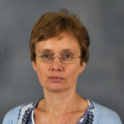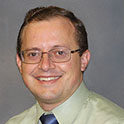
Donna Chen
"We are studying chemical reactions on metal nanoparticles and metal surfaces on the atomic scale in order to obtain information about reaction products, kinetics, mechanisms and active surface sites."
Research in physical and theoretical chemistry is focused on studies of molecular systems and chemical reactions in homogeneous and heterogeneous environments and on advanced spectroscopy. The research scope goes from theoretical and computational chemistry to synthesis and characterization of nanophase materials, to processes in solutions, catalysis and surface chemistry.

"We are studying chemical reactions on metal nanoparticles and metal surfaces on the atomic scale in order to obtain information about reaction products, kinetics, mechanisms and active surface sites."

"We are interested in understanding the nuclear quantum effects, such as the zero-point energy and tunneling, on reactivity at low temperature during the proton transfer and other processes occurring within the molecular environment. To simulate these effects we are developing the quantum trajectory-based molecular dynamics with approximate quantum corrections, which is practical to describe hundreds of atoms thanks to high-performance computing implementation."

"We study the conformations and dynamics of macromolecules and the material properties such as mechanical and rheological properties of polymeric materials. We combine computer simulations and microscopic theories to understand the relations between microscopic parameters and macroscopic response. "

"We use microscopy, spectroscopy and electronic transport measurements to explore the role of the surface in dictating the properties of semiconductor nanowires and colloidal nanocrystals. We are also interested in applications of nanomaterials in energy production and biological fluorescence imaging."

"We're working to understand how nutrient conditions affect fluorescence properties of phytoplankton. This knowledge is being used to test phytoplankton as sensors for ocean composition. It is also being used to help identify phytoplankton by their pigmentation regardless of ocean composition."

"Our lab develops and applies new electronic structure models based on electron pairs, especially useful for transition metal complexes and bond breaking. We also work on the nuclear dynamics of protons in complex systems."

"We make novel metal oxides and nanoparticles and determine their atomic structures using electron, X-ray, and neutron scattering and explore their unique electrical, magnetic, dielectric, optical and photocatalytic properties."

"The central theme of our research is to use novel physical chemistry approaches, specifically spectroscopies and microscopies, to develop quantitative understanding of novel nanophotonic materials systems and conformationally dynamic biomolecules."